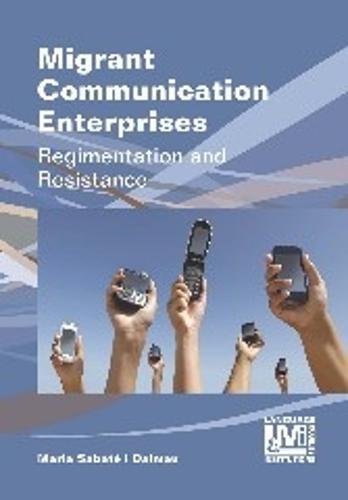Overview
This unique critical sociolinguistic ethnography explores alternative migrant-regulated institutions of resistance and subversive communication technology: the locutorios or ethnic call shops. These migrant-owned businesses act as a window into their multimodal and hybrid linguistic and communicative practices, and into their own linguistic hierarchies and non-mainstream sociolinguistic orders. Here, socially displaced but technologically empowered transnational migrant populations actively find subversive ways to access information and communication technologies. As such they mobilise their own resources to successfully inhabit Catalonia, at the margins of powerful institutions. The book also focuses on the (internal) social organisation dynamics, as well as on the simultaneous fight against, and re-production of, practices and processes of social difference and social inequality among migrants themselves.
Full Product Details
Author: Maria Sabaté-Dalmau
Publisher: Channel View Publications Ltd
Imprint: Multilingual Matters
Volume: 3
Dimensions:
Width: 14.80cm
, Height: 1.30cm
, Length: 21.00cm
Weight: 0.310kg
ISBN: 9781783092178
ISBN 10: 1783092173
Pages: 232
Publication Date: 06 August 2014
Audience:
College/higher education
,
Postgraduate, Research & Scholarly
Format: Paperback
Publisher's Status: Active
Availability: In Print

This item will be ordered in for you from one of our suppliers. Upon receipt, we will promptly dispatch it out to you. For in store availability, please contact us.
Reviews
The extreme richness and deepness of the ethnographic analysis provided by the author provides a compelling contribution for a complex understanding of the multilingual practices and the everyday challenges faced by migrants in their everyday lives in current Catalonia. With her rich discussion of the mundane activities that she was able to track during her in-depth ethnography, Maria Sabate i Dalmau grasps the mechanisms and sometimes contradictory logics that make and regulate social life and that contribute to the distribution of resources in society. -- Alfonso Del Percio, University of Oslo, Norway Multilingua 2016; aop In her in-depth and, at times, moving ethnography of a Barcelona locutorio, Maria Sabate i Dalmau affords us a unique and fascinating glimpse of migrants' multilingual practices, connections and mediations normally hidden from view. This book is an important contribution to the growing literature on languages, mobilities and globalization. -- Adam Jaworski, University of Hong Kong Maria Sabate I Dalmau's work is a most welcome contribution to the sociolinguistics of globalization, particularly at the intersection of migration, multilingualism and communication technologies. This book makes a compelling account of how states and the telecommunication industries attempt to control and contain migrants in how they use languages or how they access mobile communications, even as migrants develop their own forms of sociability to cope with these restrictions or circumvent them. -- Joan Pujolar Cos, Universitat Oberta de Catalunya, Spain
In her in-depth and, at times, moving ethnography of a Barcelona locutorio, Maria Sabate i Dalmau affords us a unique and fascinating glimpse of migrants' multilingual practices, connections and mediations normally hidden from view. This book is an important contribution to the growing literature on languages, mobilities and globalization. Adam Jaworski, University of Hong Kong Maria Sabate i Dalmau's work is a most welcome contribution to the sociolinguistics of globalization, particularly at the intersection of migration, multilingualism and communication technologies. This book makes a compelling account of how states and the telecommunication industries attempt to control and contain migrants in how they use languages or how they access mobile communications, even as migrants develop their own forms of sociability to cope with these restrictions or circumvent them. Joan Pujolar Cos, Universitat Oberta de Catalunya, Spain
In her in-depth and, at times, moving ethnography of a Barcelona locutorio, Maria Sabate i Dalmau affords us a unique and fascinating glimpse of migrants' multilingual practices, connections and mediations normally hidden from view. This book is an important contribution to the growing literature on languages, mobilities and globalization. Adam Jaworski, University of Hong Kong
Author Information
Maria Sabate i Dalmau is a lecturer in the English and Linguistics Department at the Universitat de Lleida, Catalonia, Spain. Her research interests include the study of communication and language practices in bilingual and multilingual, migration and language minority contexts, particularly in Catalonia.




